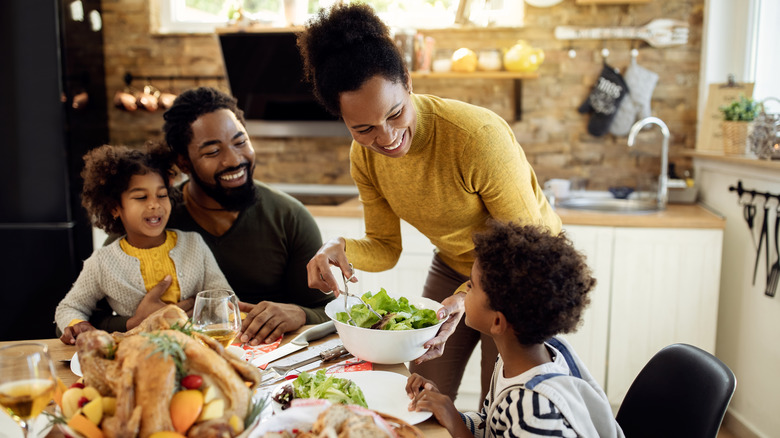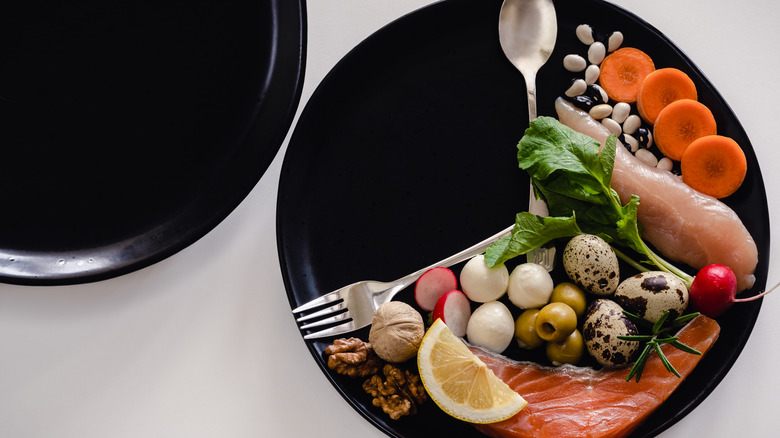Eating An Early Dinner Is Actually Way Better For Your Life
After years of ridicule and snide comments (albeit funny ones), I finally feel vindicated for eating dinner at a time once reserved for senior citizens, the early birds, as more of my contemporaries discover the joys of an early supper. The practice that started when my children were young became a way of life I embraced long after the fear that a lengthy wait for a table would provoke a hangry toddler temper tantrum.
As my family grew, eating dinner together became a protected ritual. I knew plenty of parents that fed their kids early and waited to eat with their partners later, but I didn't want to prepare and clean up two meals. More so, I valued time at the kitchen table as a family, so we ate dinner before 6 o'clock to accommodate the kids, the least flexible household members. It became part of our routine where I learned about their lives, evolving personalities, and concerns, as eating delicious food together magically opened them up. They shared stories beyond the single-word response I got after school when asked, "How was your day?" Fine!
While getting the four of us to enjoy a family dinner together daily became increasingly tricky, balancing work and my part-time chauffeuring gig driving the kids to friends' houses and sports, dinner was the best chance for us to connect. Over time I discovered I preferred eating early even when the kids weren't involved and that my body responded better, too.
Unexpected benefits of eating dinner early
As the kids returned from school like rabid beasts, I learned early on that the afternoon snack, while essential for morale, could derail dinner. No matter what they ate when they came home, they were hungry all over again by 5 o'clock, and frankly, I was too. As they grew, the situation intensified and so, rather than giving them another snack and pushing dinner back, we began to eat dinner around 5:30 pm, and it worked.
This pragmatic approach to mealtime came with benefits I hadn't considered as a new mom. The obvious advantage was that this was less work since I didn't have to prepare or clean another meal; even a snack pack in a little human's hands could look like a frat party's aftermath, but it also helped me examine what I was really putting into my body.
While I thought I was eating "healthy," I realized I was consuming hundreds of unintended calories, adding a late afternoon meal to the day to tide me over until dinner. Shifting dinner to 5:30 cut a meal from my diet without suffering from hunger pains or feeling like I was depriving myself.
There's always a table at our favorite restaurant
On the days when I need a break from cooking, eating at 5:30 means we have our pick of restaurants any night of the week. Without reservations, we can whisk in and be seated immediately, watching the place fill up as we pay the bill. Admittedly as my kids got older, being the first people in a restaurant was devastatingly embarrassing to them, but that quickly dissipated with the sight of food.
While I have to compromise for friends who prefer to or have to eat later because of work, I have a friend who has always appreciated the early meal. We meet at five at our favorite Italian restaurant, sit at the bar, enjoy a few cocktails, eat a pound of pasta each, and catch up. Our dinners are effortless without waiting for a seat or the kitchen to get backed up. By 8 o'clock, we are home comfortably in our jammies, and I love that.
The same is true at home. No matter how elaborate the meal I prepare is, eating early means you are done early, leaving the bulk of the evening to relax. The dishes are put away by 7 p.m., and the kids are off to do homework or shower, leaving hours left in the day.
Lowers blood sugar and helps lose weight
I noticed that on the days when I eat late, my sleep and digestion are affected. Going to bed on a full stomach is a recipe for a restless night and groggy tomorrow. Plus, I somehow wake up ravenous, a feeling I don't usually experience since I've been intermittent fasting for years. When I stick to my routine, I don't get hungry until late morning, meaning between 11 a.m. and 7 p.m., I consume all my calories without restricting my diet. This lifestyle change has kept my weight in check, relieved my digestive discomfort for years, and apparently, there's a scientific reason to explain why.
A 2020 study published by the Endocrine Society's Journal of Clinical Endocrinology & Metabolism found that maintaining your body's circadian rhythms may impact "the risk of obesity and metabolic syndrome." Participants that ate late dinners close to their bedtime had 20% higher blood sugar levels and 10% lower fat-burning than the early birds. The findings suggest that the times at which you eat and sleep affect how your body responds to those calories. The adage, "calories in, calories out," oversimplifies weight management.
Naturally, there are outliers, and the people most affected by late-night meals were people (like me) who prefer an early bedtime, making late-night meals a catalyst for weight gain. Healthier or not, eating dinner early signals that your work day is complete, all the more reason to eat early.



